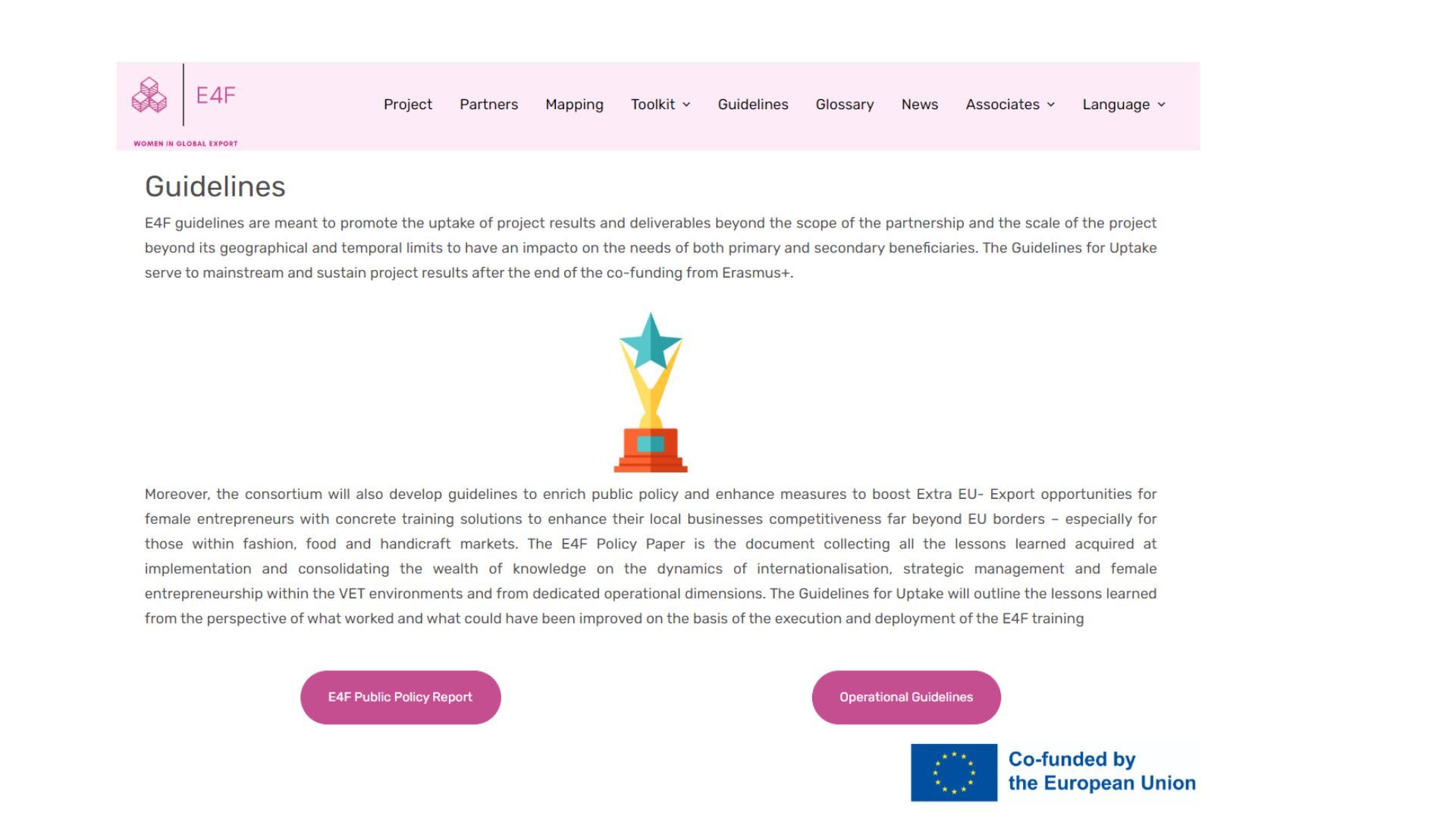
E4F, Femmes Chefs d'entreprise à l'Export hors de l'EU, is a Project co-funded by the Erasmus Plus Programme of the European Commission, which brings together 7 partners from 5 different countries (France, Italy, Slovenia, Belgium, Spain).
The PR4 phase of the E4F project has marked a significant milestone, encompassing two critical components that have advanced the project's mission of empowering women-led SMEs and fostering internationalization in the VET environment:
a) E4F Public Policy Report: This comprehensive document serves as a repository of valuable insights gathered during the project's implementation. It consolidates knowledge on internationalization dynamics, strategic management, and female entrepreneurship within VET environments. The report distills the lessons learned, offering a wealth of information that can guide future initiatives in these areas.
b) E4F Guidelines for Uptaking: These guidelines are an invaluable resource that outlines the successful aspects of the project, providing a roadmap for what worked well and areas where improvements can be made. They encompass a wide range of elements, including training organization, communication with target groups, enrolment, classroom management, blended learning, online delivery, learner motivation, and feedback. These guidelines are intended to facilitate the integration of E4F training into organizations outside the partnership, creating a lasting impact.
PR4 marked a significant step forward in terms of innovation and systemic impact, particularly in the domains of ICT, finance, law, and strategic management for global internationalization opportunities. Importantly, it extended the reach of E4F beyond the geographical and temporal borders of the partnership, promoting the transferability and adaptability of project results to other actors in education, training, and policy.
What sets PR4 apart is its commitment to inclusivity. The deliverables, including the E4F Public Policy Report and Guidelines for Uptaking, are available in five languages, ensuring accessibility for a wider audience. They are provided in open access and free versions, fostering collaboration and knowledge sharing in the fields of training, consultancy, strategic management, internationalization, SME competitiveness, and female entrepreneurship empowerment.
The project is nearing a successful conclusion, as reflected in the statistics of visits to the OER platform, the massive follow-up of the training courses and the feedback received by users and stakeholders at the many events at which the project has been presented.
All partners actively participated in the meeting, reviewing the latest steps towards the closure of the project and exploring new possibilities for future collaboration.
More information: https://www.e4f-network.eu/
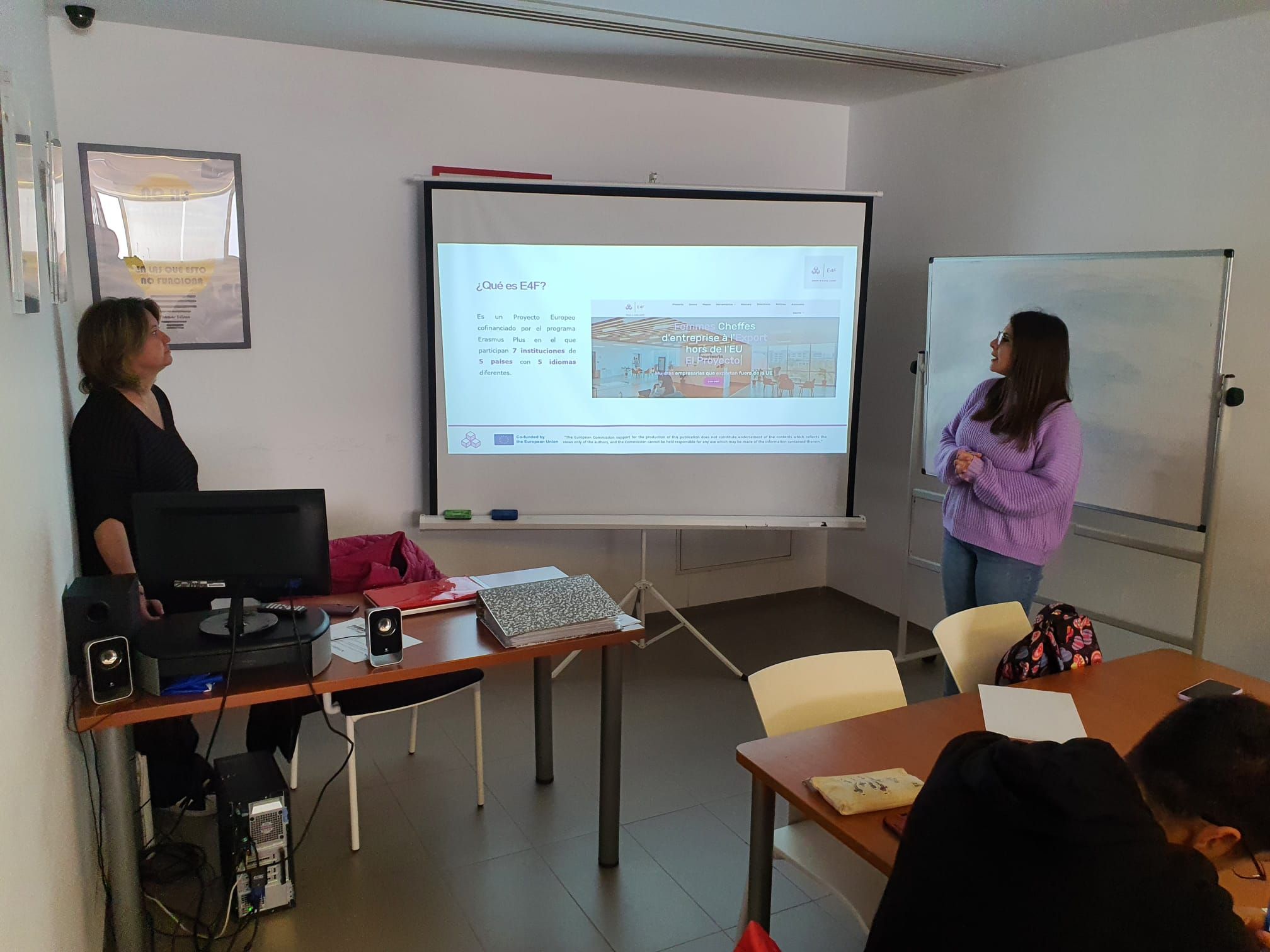
IWS organised a Multiplier Event on the 13th of February 2023 in Málaga.
The Multiplier Event took place in the Project´s Associated Partner Arrabal AID venue.
IWS has engaged women entrepreneurs and potential entrepreneurs, interested in expanding their business outside the EU.
The event agenda included the following points:
Presentation of EU Programmes and Values
E4F in the context of the Erasmus Plus Programme
Overview of Consortium, Target and Objectives
Overview of Project Results reached and future
• Mapping Export Dynamics, Challenges & Opportunities for female-run business.
• Training content
• Next steps: Guidelines for uptaking the project results and deliverables
16 participants corresponding to the E4F Project target groups attended the event.
Participants had the opportunity to learn different tools and strategies for exporting outside the EU. All of them were enthusiastic about the development of the project and its usefulness for entrepreneurs who intend to export outside the EU.
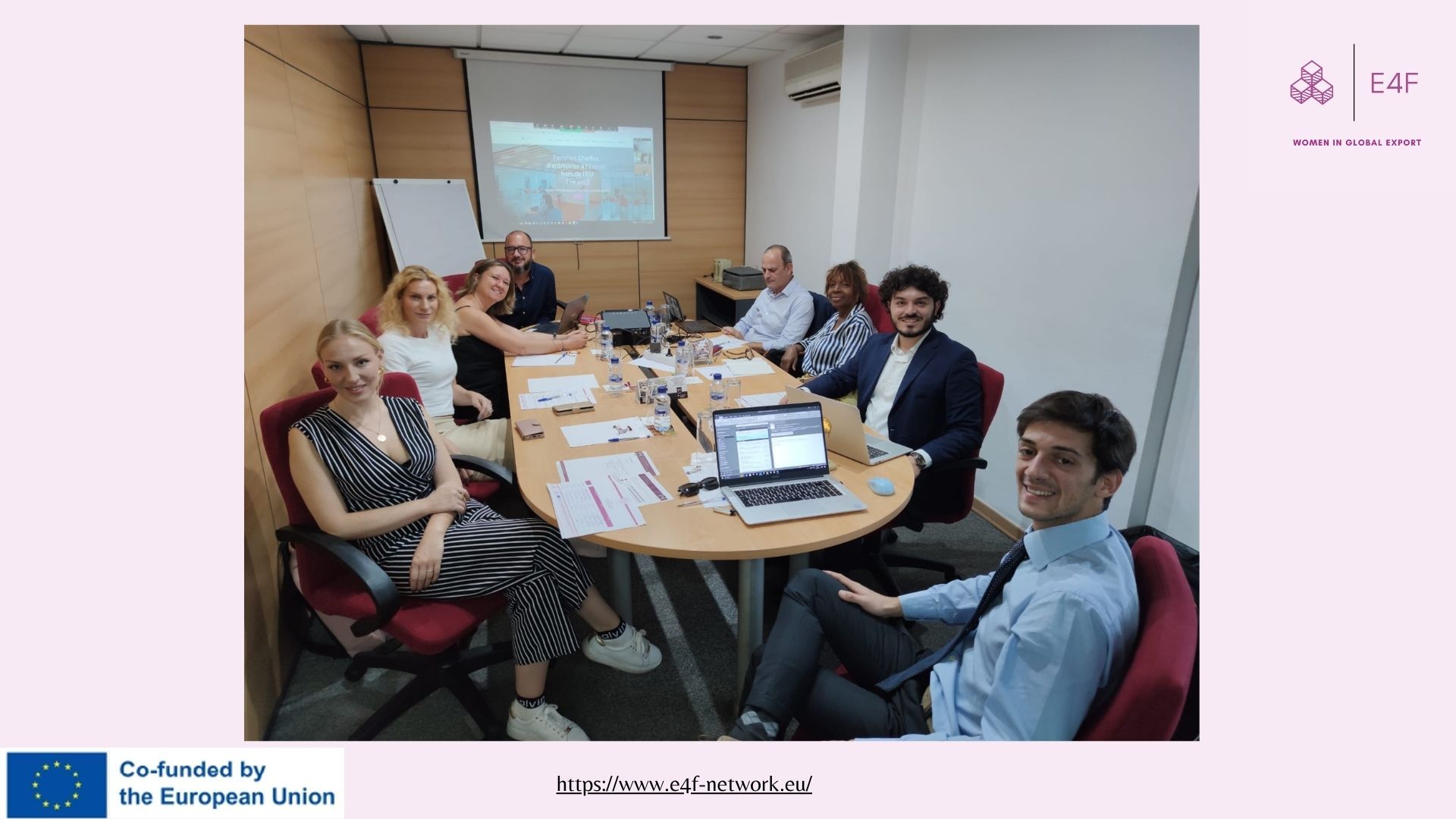
On the 21st of September 2023, the Project E4F consortium joined the Closing Meeting of E4F in Malaga (Spain), a Project co-funded by the Erasmus Plus Programme of the European Commission, which brings together 7 partners from 5 different countries (France, Italy, Slovenia, Belgium, Spain). The main objective of E4F is to support and revamp the potential of female SMEs and microenterprises to tap into extra-EU markets export. The project aims to build and reinforce the capacity, skills and competencies of female enterprises to export to extra-EU markets by developing innovative training and capacity-building programmes and tools that will ignite their export potential. The heterogeneous character of the E4F consortium embodies in itself the entire essence of the project. The partnership gathers professional organisations from different geographical European regions, including ultra-peripheral areas which are already part of the global market, with extensive experience in female entrepreneurship, export promotion, vocational education and training, and digital development. Furthermore, most partners already represent the target group of women entrepreneurs and SMEs, including a strong participation of females within the working teams. During the closing meeting, the overall development of the project was reviewed with a focus on the following points: Project Management and Reporting. Dissemination and visibility. Quality Assurance. PR4 Public Policy Upscaling and Training Uptake Guidelines. PR1 OER Platform and Project Website PR2 Map Export Dynamics, Challenges & Opportunities for Female-run Businesses PR3 Develop E4F Tool-Kit The project is nearing a successful conclusion, as reflected in the statistics of visits to the OER platform, the massive follow-up of the training courses and the feedback received by users and stakeholders at the many events at which the project has been presented. All partners actively participated in the meeting, reviewing the latest steps towards the closure of the project and exploring new possibilities for future collaboration.
Read more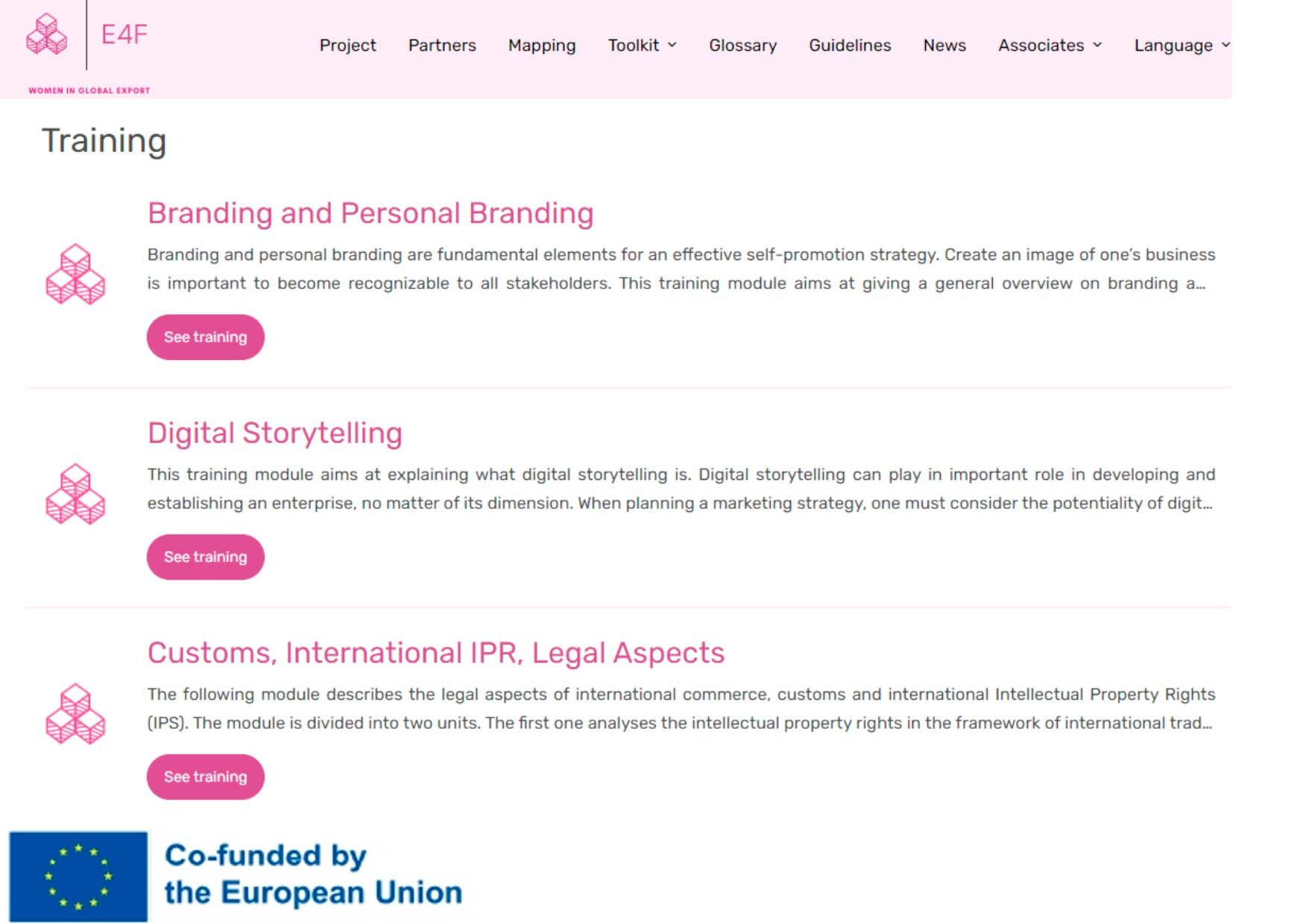
E4F highlighted that EU female SMEs represent only 18% of EU exporting SMEs. This reveals a strong gender gap within Europe, considering that 62% of the jobs dependent on exports are occupied by men compared to 38% by women. This is confirmed also by seeing the special distribution of female SMEs in Europe. A survey conducted by the WEgate Platform (“A Survey of Women Entrepreneurs in Europe”, 2020) revealed the following:
“Women make up 52% of the total European population, but only 34.4% of the European Union (EU) self-employed and 30% of start-up entrepreneurs. Given their creativity, entrepreneurial capacities and talents, they are an under-utilised resource that could become the new driving force for the next generation of Europe”
The situation of female SMEs in Europe could be summarised through several key highlights, stemming from the international needs-assessment carried out by partners:
• Based on our transversal and cross-national analysis, there seems to be a lack of tailored quantitative data on the phenomenon of internationalisation for female-run businesses operating in the food, fashion and handicraft industries. With this considered, our assessment focused on second best desk research which highlight interesting insights upon export dynamics as a whole
• Training resources are indeed available at EU level, but with coefficients of granularity that seems missing the framing of internationalisation as a stand-alone capacity building’s field
• Although gender-centred statistics on EU SMEs are largely available, when it comes to export and internationalisation the analysis of the phenomenon loose a diversification of such scale
The research concluded by partners, and results stemming from the evaluation, confirmed the existence of several training areas that could indeed function as triggers for new development pathways based on international competitiveness, growth and profitability through the penetration of foreign markets.
Four main training areas gathers together the training modules developed by partners:
• Strategies for Internationalisation
o Market Research/market analysis
o Risk Analysis
o Business Plan for Internationalisation
o Customs, International IPR, legal aspects
• E-commerce, international and digital marketing
o International digital marketing: strategies and tools
o Business models in International digital marketing IWS
• Social selling
o Branding and Personal branding
o Digital Story Telling
• Sociologic and cultural aspects of Extra EU Export
o Cross cultural management
o Business etiquette in an international environment
All training material will be available for free, in open access and Multilanguage version via the official Open Education Resource Platform of the project: www.e4f-network.eu
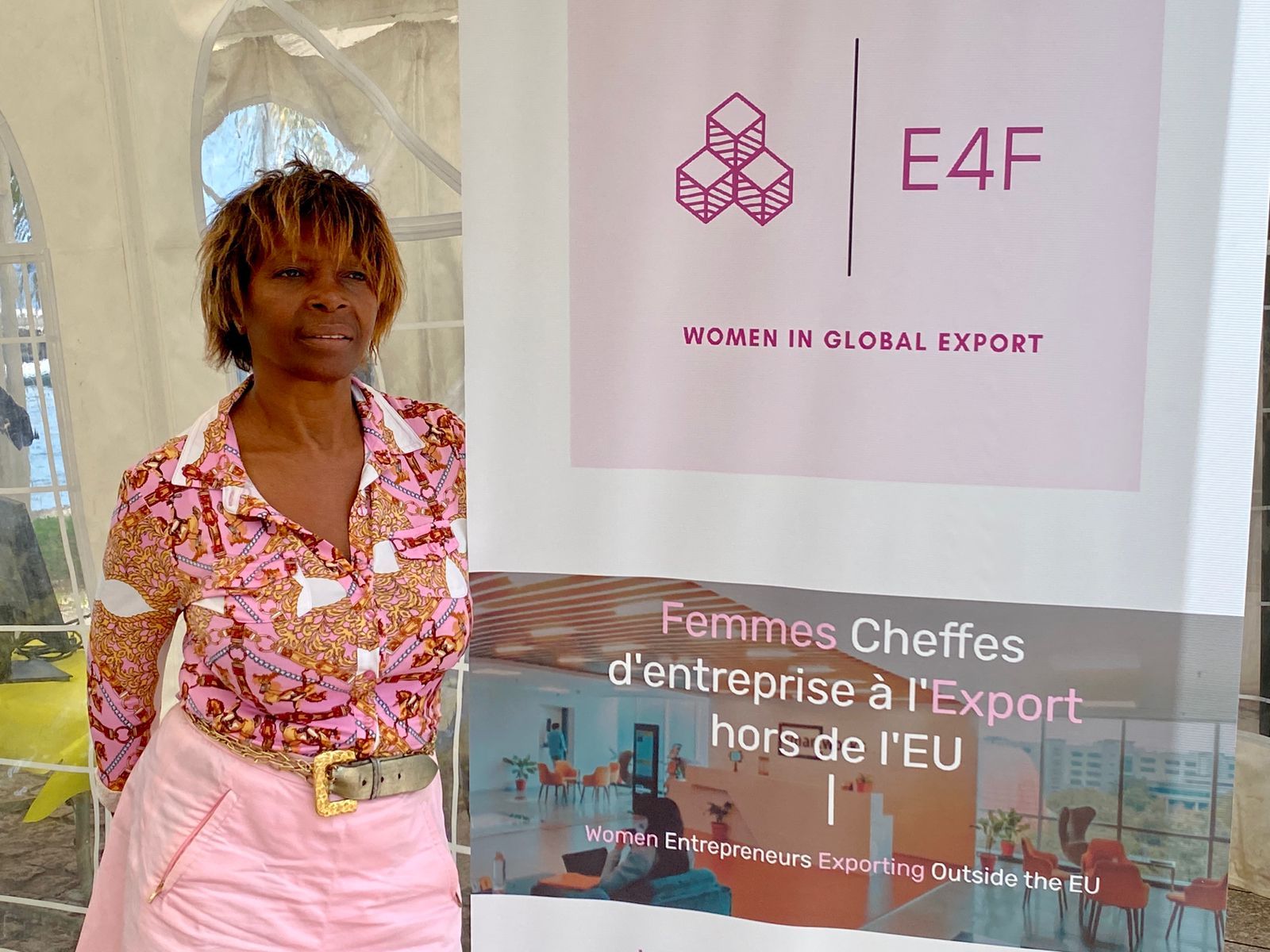
CCEM and OPEN IT participated in the 8th edition of the Employment and Training Village in St Pierre on September 15, 2022.
This Village brought together Training professionals, Employment and Professional integration aid structures, the Gendarmerie, the Army, the Police, the Penitentiary Center, all the Institutions, the Prefecture and the local authorities of Martinique.
The main objective of this event is to facilitate the integration of young people through employment. Some of them are in the process of creating a company or carrying out a project. We also had the opportunity to promote E4F to training and integration organizations. We were interviewed by the local radio-television channel-internet Martinique la 1ère and by the Mission Locale Nord of Martinique and broadcast on YouTube.
The public has been sensitive to this E4F initiative and is looking forward to the next contents.
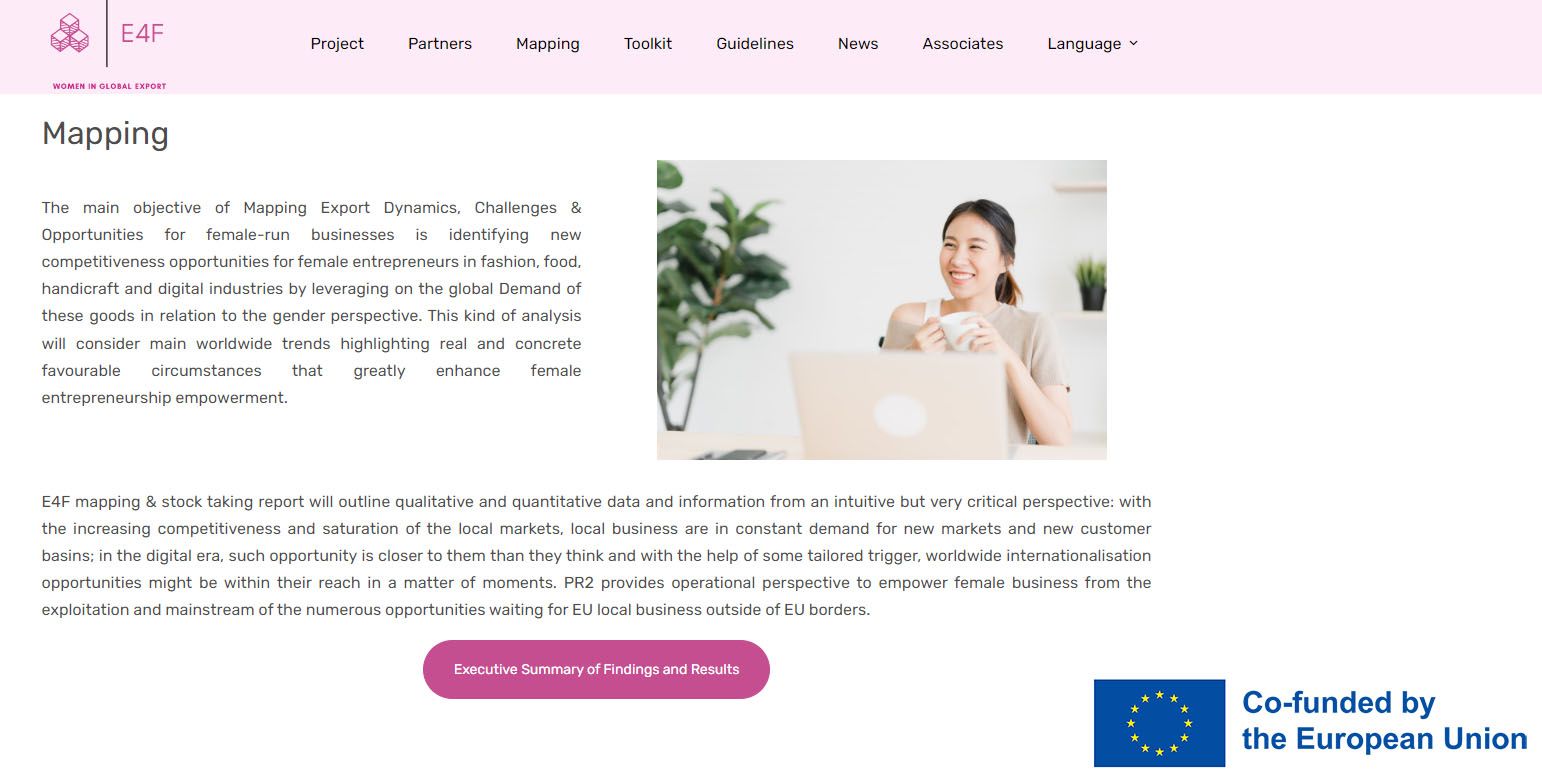
SMEs are the economic core of Europe and social buffer generating jobs. Internationalisation and Export outside of Europe represent a great opportunity, creating million jobs. However, the socio-economic potential of EU SMEs is underexploited: only 18% of European SMEs export to extra-EU markets and are truly international. Official papers from the European Commission (EU/UN-INTRACEN report 2019 “From EU to the World: Understanding Challenges for EU Businesswomen”) confirmed that the extra-EU internationalisation process is exacerbated for female enterprises. Interviews with female entrepreneurs showed that this target group needed the following trends: grow and bring their businesses within international markets training sessions in digital aspects, and internationalisation legal policies strengthen their marketing and communication strategies boost their global competitiveness through training session in digital format E4F project aims at empowering women-led businesses, creating opportunities to increase their productivity, expanding the geographical markets in which they operate. E4F aims to implement the following points: Boost the global competitiveness of EU female SMEs in Fashion, Food, Handicraft sectors by using innovative, operational, and practical trainings. Develop an open and multilingual platform called OER, that will host innovative training. Identify needs and challenges of female small businesses Correct the gender gap to establish conditions that allow internationalisation of female small businesses The training material of the project will be developed on the basis of the results and findings of the desk research carried by partners in the last nine months. Partners analysed quantitative indicators on the phenomenon of internationalisation of EU female-led SMEs, Qualitative indicators on internationalisation in their country (skills-gap and need assessments), opportunities and challenges women entrepreneurs may find. The main objective of the research was identifying new competitiveness opportunities for female entrepreneurs in fashion, food and handicraft industries by leveraging on the global demand of these goods in relation to the gender perspective. This kind of analysis considered the main worldwide trends highlighting real and concrete favourable circumstances that greatly enhance female entrepreneurship empowerment. To find more about the project visit www.e4f-network.eu
Read more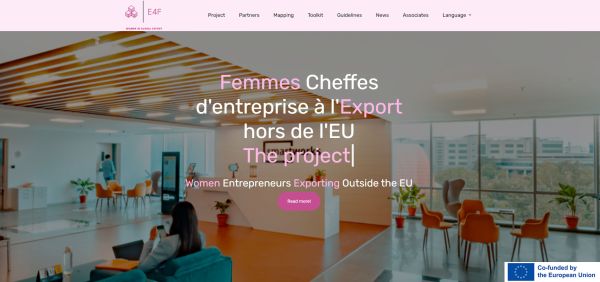
The women entrepreneurs of the French West Indies will soon have a digital platform. They will be able to collaborate with their counterparts in Belgium, Italy, Slovenia, Spain and France in order to improve their practices, develop tools or methods, and transnational networks. It is the project of the CCEM (Collective Cooperation Export Martinique) that has been selected by the European program Erasmus +. Jean-Claude Samyde - Published on March 15, 2022 at 3:43 pm A digital platform will bring together women entrepreneurs from Europe and the Antilles-Guyana. Funded by the European program Erasmus+, this website specially designed to meet the information needs of women entrepreneurs will be operational in November 2022. Strict regulations The Martinique association (CCEM) has respected the precise timeline set up for an Erasmus+ project. Its president Viviane Chiffrin and her partner Denis-Antoine Hérault of OPEN-It, participated in a call for proposals that included a number of steps. First, they had to develop a project eligible for the European program, and support their idea in front of a commission. These calls for proposals are subject to the legislation governing public procurement. This project of several thousand euros is taking shape with partners from Belgium, Italy, Spain, Slovenia and France. The digital platform managed from Martinique by the CCEM is expected to be operational in November 2022. In the meantime, the project partners must send an interim report to the Erasmus + agency on the project's progress. Making a place for yourself This platform for women entrepreneurs is integrated into the Erasmus+ program for the period 2021-2027. This project allows the financing of study and professional mobility (internships, continuing education) within Europe and internationally at all ages and for all levels of training. The issue of gender parity is gradually making its way into the business world. All is not completely won. This digital platform project will also connect women who hesitate to start their own business, between self-censorship, feelings of illegitimacy and complicated access to credit. Jean-Claude SAMYDE, Martinique la 1ère
Read more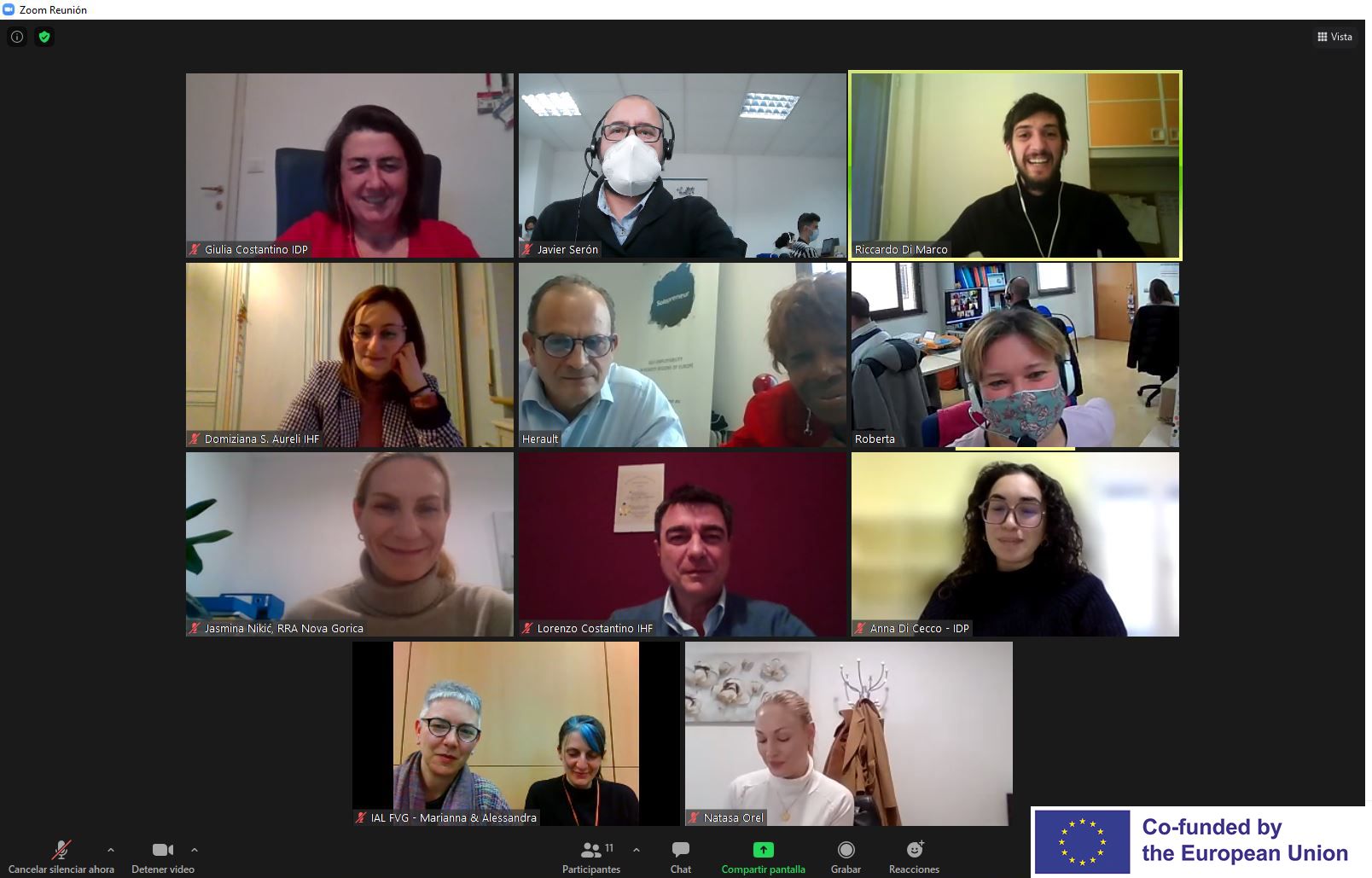
On the 31st January 2022, the Project E4F consortium joined the Kick-Off Meeting of E4F, a Project co-funded by the Erasmus Plus Programme of the European Commission, which brings together 7 partners from 5 different countries (France, Italy, Slovenia, Belgium, Spain). The main objective of E4F is to support and revamp the potential of female SMEs and microenterprises to tap into extra-EU markets export. The project aims to build and reinforce the capacity, skills and competences of female enterprises to export to extra-EU markets by developing innovative training and capacity building programmes and tools that will ignite their export potential. The heterogeneous character of E4F consortium embodies in itself the entire essence of the project. The partnership gathers professional organisations from different geographical European regions, including ultra-peripheral areas which are already part of the global market, with an extensive experience in female entrepreneurship, export promotion, vocational education and training, and digital development. Furthermore, most partners already represent the target group of women entrepreneurs and SMEs, including a strong participation of females within the working teams. At project implementation, partners will carry out the following activities: • Develop and manage the content and adoption of the E4F multilingual OER Platform. • Take stock of the Export Dynamics, Challenges & Opportunities for female enterprises in extra-EU markets. • Develop the E4F Training in multiple language versions to promote adoption and use. • Deploy and substantiate the E4F training with 120 representatives of the target groups. • Produce the Public Policy report on the relevance of female SMEs’ internalisation and promotion of E4F Training During the meeting, the consortium discussed the overall project implementation schedule, defining timelines and respective duties.
Read more